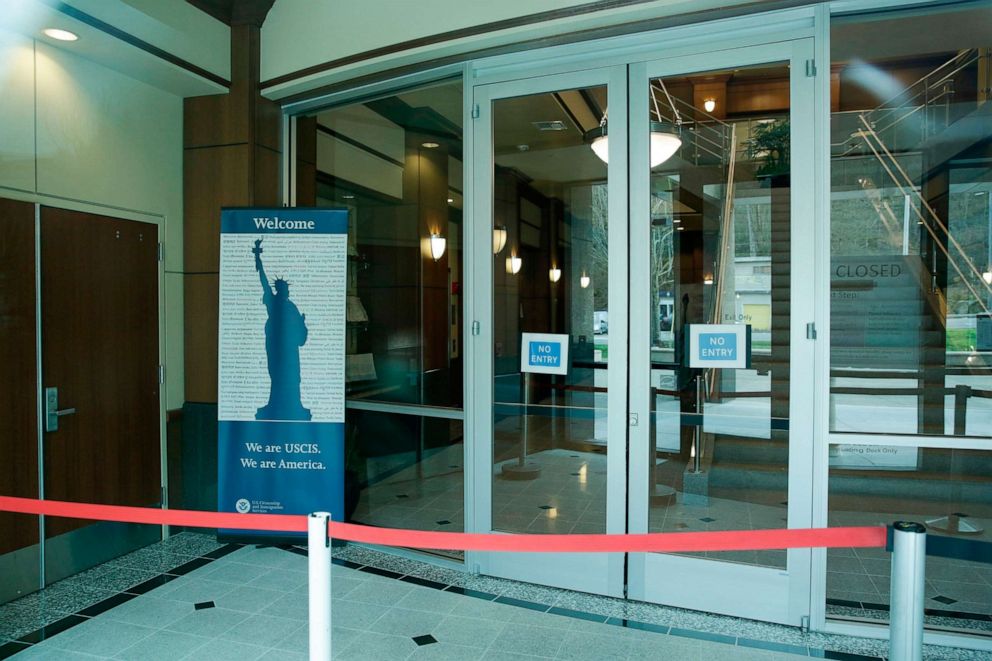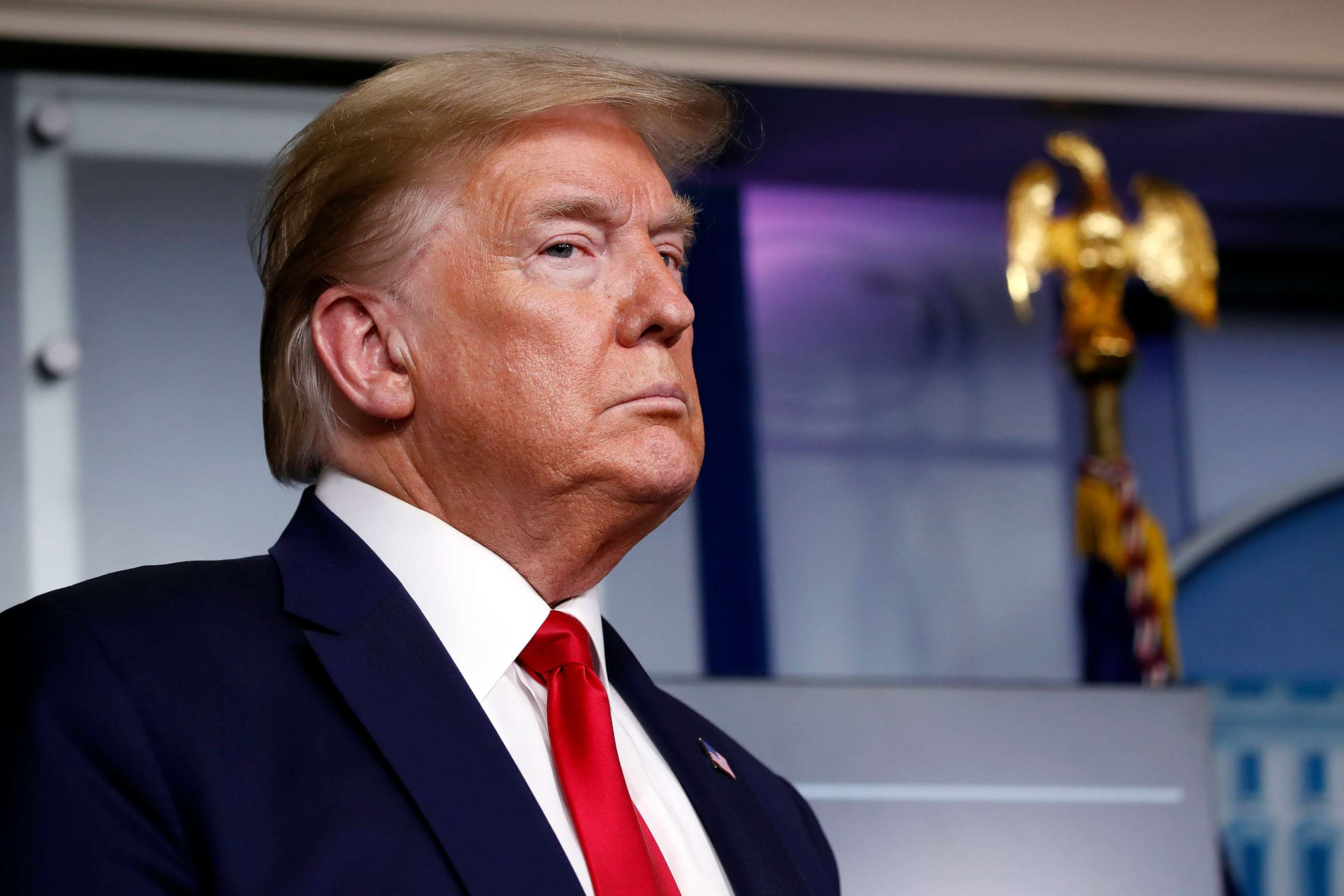Trump's threat of total immigration ban ignites outrage, confusion
The announcement is part of a familiar pattern Trump displays in election years.
President Donald Trump's announcement on Twitter that his administration would temporarily stop immigration into the U.S. amid the pandemic ignited both confusion and outrage Tuesday as the true consequences of the order remained unclear and advocacy groups feared yet another crackdown on vulnerable immigrants.
"In light of the attack from the Invisible Enemy, as well as the need to protect the jobs of our GREAT American Citizens, I will be signing an Executive Order to temporarily suspend immigration into the United States!" Trump tweeted late Monday night.
Administration officials did not respond to requests for comment about what impact such an order would have on the wide range of legal immigrants already in the U.S. including those who rely on temporary work visas or are currently applying for citizenship or legal permanent residency.
At the White House Coronavirus Task Force briefing later Tuesday, Trump said the suspension would only apply to those seeking legal permanent residency authorization, commonly known as "green cards." He said the order would not apply to those on temporary work visas, specifically singling out farm workers.
Although it remains unclear when the order will start impacting green card applications done outside the country, Trump said he planned on signing the order Wednesday and that it would last for 60 days.
"By pausing immigration, we will help put unemployed Americans first in line for jobs as America reopens," Trump said.
In-person interviews were already suspended under U.S. Citizenship and Immigration Services coronavirus protocols, meaning applicants already in the country could not complete the process.
Reaction criticizing the move swiftly followed Trump's Monday night announcement on Twitter.
"Trump failed to take this crisis seriously from day 1. His abandonment of his role as president has cost lives. And now, he's shamelessly politicizing this pandemic to double down on his anti-immigrant agenda. Enough, Mr. President. The American people are fed up," Sen. Kamala Harris, D-Calif., shot back in a tweet.
Former Obama White House policy adviser Doug Rand said Trump's announcement would further complicate the process for applicants already struggling with the impacts of COVID-19.
"What it means is you can't live with your spouse in the United States," said Rand, who now heads Boundless Immigration, a legal support group for green card applicants. "You can't even see them, potentially, until the government decides that this temporary period is over."
Rand said the indefinite nature of the ban resembles Trump's move to block immigrants from Muslim-majority countries in 2017. A version of trump's "Muslim ban" remains in place, although it includes many categories of exemptions after immediate legal challenges brought the policy to the Supreme Court.
Green card applicants primarily include family members of U.S. citizens and those already established and employed in the U.S. Green card applicants also include those seeking humanitarian protections and as well as a much smaller pool of applicants from countries with low levels of U.S. immigration that participate in the diversity visa lottery program.
White House press secretary Kayleigh McEnany said in a statement Tuesday morning that, "At a time when Americans are looking to get back to work, action is necessary."
Tune into ABC at 1 p.m. ET and ABC News Live at 4 p.m. ET every weekday for special coverage of the novel coronavirus with the full ABC News team, including the latest news, context and analysis.
While it wasn't clear what prompted the president's move at this time or on what legal grounds an executive order might be based, the announcement is part of a recurring pattern of Trump leaning on executive authority to announce sweeping immigration restrictions during an election year.
"This is a desperate attempt by the Trump administration to shift blame away from its incompetent response to the Coronavirus while tens of thousands of Americans are dying across the country," said Paola Luisi co-director of the immigrant advocacy group Families Belong Together.

Nationalist messaging was a hallmark of Trump's 2016 campaign as he vowed to be "tough" on China, targeted Mexican immigrants as a source of crime and proposed a ban on Muslim immigrants.
The political pattern became clear in 2018 when Trump seized on the news that a group of migrants seeking refuge in the U.S. had formed a caravan. Trump responded by sending U.S. troops to the southern border, where their support of immigration officers was limited to basic logistical duties including the installation of barbed wire.
Throughout his presidency, Trump has added real action to the rhetoric. The administration has already leveraged legal authorities this year to implement highly restrictive immigration measures in the name of public health amid the pandemic.
Prior to Monday's announcement, USCIS had already stopped all in-person services for new visas and green cards, with naturalization ceremonies on hold until at least May.
Asylum interviews for refugees were canceled with the promise they'll be automatically rescheduled after USCIS resumes normal operations.

The administration has also barred foreign nationals traveling from China and several European countries with narrow exceptions for immediate family members.
In addition to the current restrictions on legal travel, U.S. Customs and Border Protection continues to refuse entry to unauthorized travelers while immediately removing those who cross illegally under an expedited process that largely cuts out the typical administrative review and adjudication process.
Federal authorities deported or "expelled" more than 6,300 unauthorized immigrants from the border in March "in the interest of public health" under Title 42 of the U.S. Code, according to CBP.
Trump's Twitter announcement raised further questions about the fate of the most vulnerable immigrants and refugees who rely on humanitarian visas which have previously been excluded from certain immigration restrictions.
"Already at-risk groups like immigrant survivors of violence, who are among the communities hardest hit by the pandemic, will be further marginalized," said Archi Pyati of the Tahirih Justice Center, an advocacy and support group for human trafficking victims. "People are suffering across the country because of an unprecedented global health crisis and its impact on our economy -- not because of immigrants,"
If Trump's tweet Monday evening means all non-citizens would be unconditionally barred from entry, the move would be unprecedented in U.S. history.
Immigration had already slowed when the deadliest pandemic of the 20th century hit in 1918. At the time, even the "Spanish Flu" didn't prompt a full closure of U.S. borders. The number of immigrants arriving in the U.S. dropped to 110,618 in the year 1918, down from 1,218,480 in 1914, according to Census Bureau data.
ABC News' Ben Gittleson, Anne Flaherty and Libby Cathey contributed to this report.
What to know about coronavirus:
- How it started and how to protect yourself: coronavirus explained
- What to do if you have symptoms: coronavirus symptoms
- Tracking the spread in the US and Worldwide: coronavirus map




